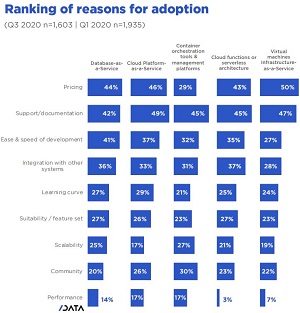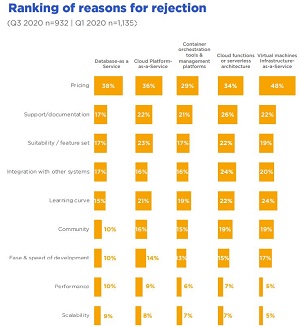News
What Matters to Developers Choosing Cloud? Pricing and Support/Documentation
Developer-centric research firm SlashData published a new report indicating pricing is the No. 1 factor in choosing or rejecting a cloud computing technology, followed by support/ documentation.
The report is titled "Developer Economics State of the Developer Nation, 19th Edition," which comes out every sixth months.
In this edition, developers were asked why they adopt or reject cloud technologies.
"For every cloud technology, with the exception of orchestration tools, pricing and support/documentation are the two most important factors that developers consider when adopting that technology," the report said. "For the most part, these two factors switch between first and second place, however, pricing drops to fifth place for developers considering adopting an orchestration tool, whereas support/documentation remains at the top by a large margin. Around three in ten of these developers selected ease and speed of development (32 percent), integration with other systems (31 percent), community (30 percent), and pricing (29 percent) as reasons for adoption, with pricing being around 15 percentage points lower for orchestration tools than for other technologies.
 [Click on image for larger view.] Reasons for Cloud Adoption (source: SlashData).
[Click on image for larger view.] Reasons for Cloud Adoption (source: SlashData).
"On the other hand, community and scalability are generally more important for developers selecting an orchestration tool."
On the flip side, the reasons for rejecting a cloud technology are also topped by pricing.
 [Click on image for larger view.] Reasons for Cloud Adoption (source: SlashData).
[Click on image for larger view.] Reasons for Cloud Adoption (source: SlashData).
"Taking developers’ reasons for rejection into account lets us view the decision-making process from the other side. Immediately, we see that pricing is the dominant factor when rejecting every technology," the report said.
"Taking a closer look at the data shows the true extent of this -- for DBaaS and Infrastructure-as-a-Service (IaaS), developers were more than twice as likely to select pricing as a rejection reason than the second- and third-placed reasons of support/documentation, and the learning curve, respectively.
"Amongst the remaining technologies, the smallest difference was 8 percentage points, for developers rejecting orchestration tools. Further down the list, there is a lot of variability between the different technologies. For example, the learning curve was the second most popular rejection reason for developers choosing IaaS, with a quarter of them doing so. This suggests that the learning curve for IaaS is quite steep and that this is a barrier for many developers. This is not the case for DBaaS however, where only 15 percent of developers stated this as a reason for rejection."
Other highlights of the report not related to programming languages include:
- Four in ten developers report that they need more flexibility in working hours/workload as a consequence of COVID-19.
- Collaboration tools and platforms are the most important technical need for developers.
- The vast majority of professional developers (more than 80 percent) are involved in DevOps in one way or another.
- Continuous integration (CI) and continuous deployment (CD) are two of the most common DevOps practices, but only one in four developers use both to fully automate their workflow.
- Developers appreciate collaborating and interacting with the open-source community more than contributing to open-source projects.
- Pricing and support/documentation dominate developers’ decision-making process when adopting a cloud technology, but pricing is by far the most important reason for rejection.
- Emerging technologies such as AR and VR are not fully engaging OSS principles.
- Little change in engagement and adoption rates indicate that DevOps has reached maturity.
- Fog/edge computing is gaining traction amongst developers engaged with the topic, but overall engagement is low.
The 19th Developer Economics global survey wave ran from June to August 2020 and reached more than 17,000 developers in 159 countries. The report is available for free at the link above upon providing registration information.
About the Author
David Ramel is an editor and writer at Converge 360.